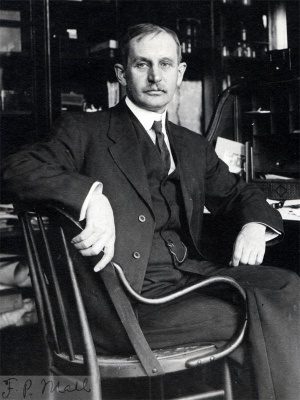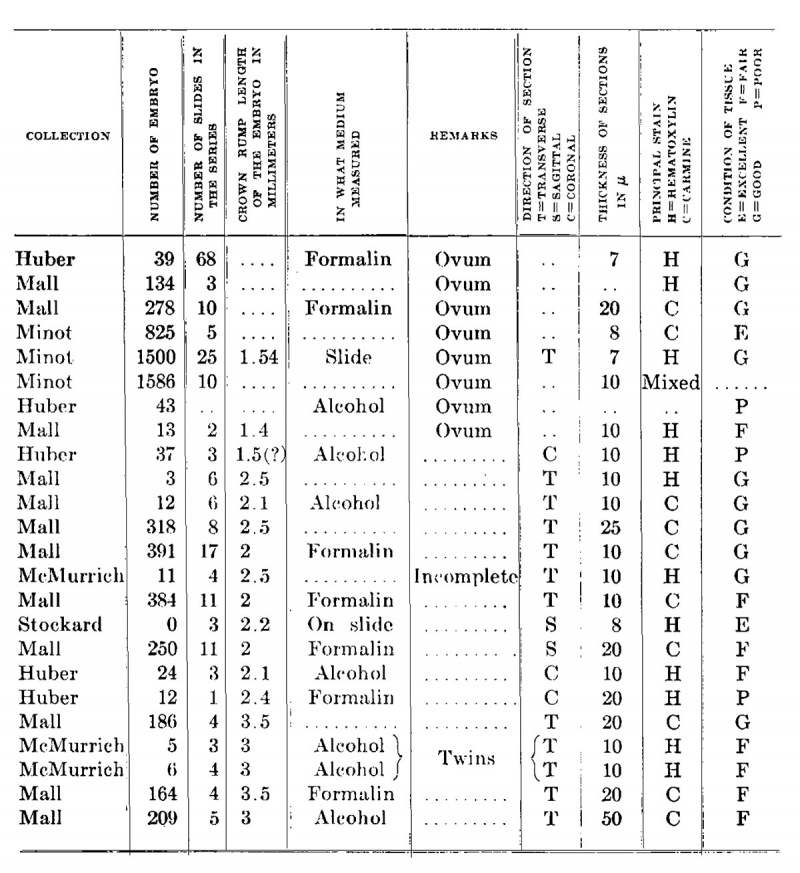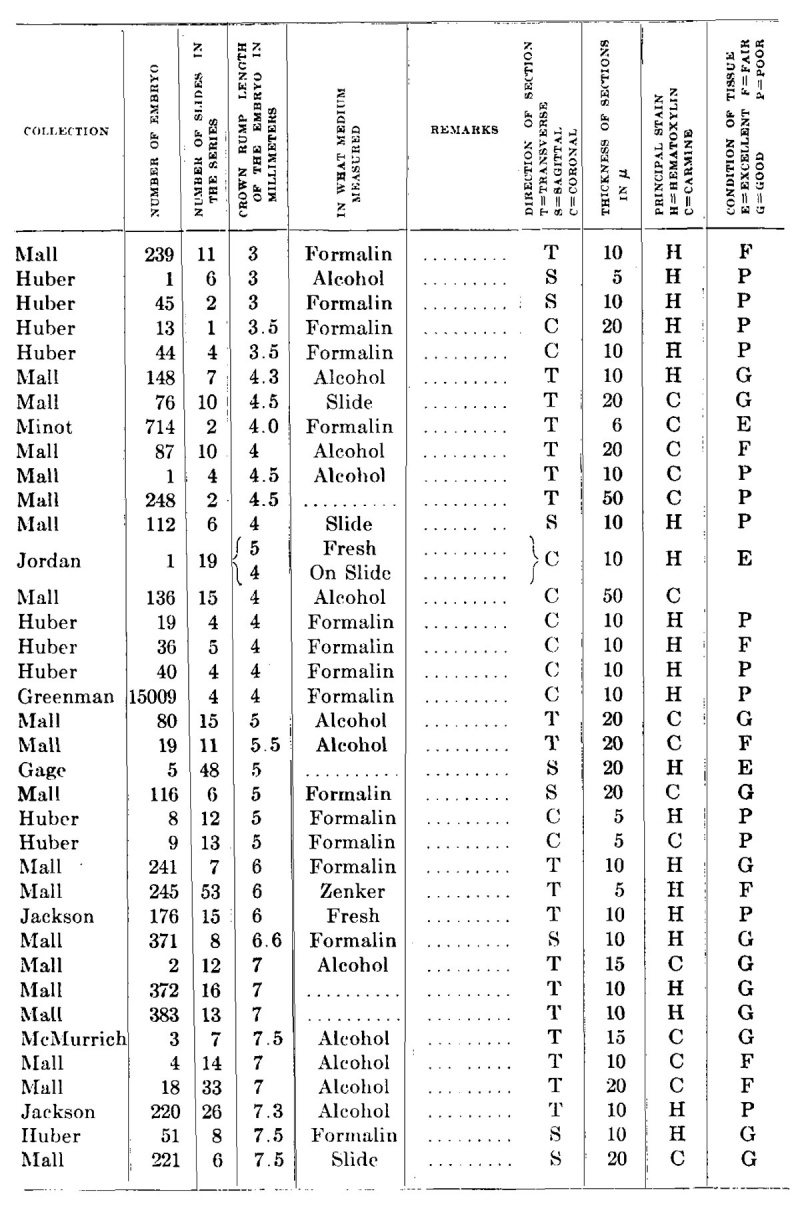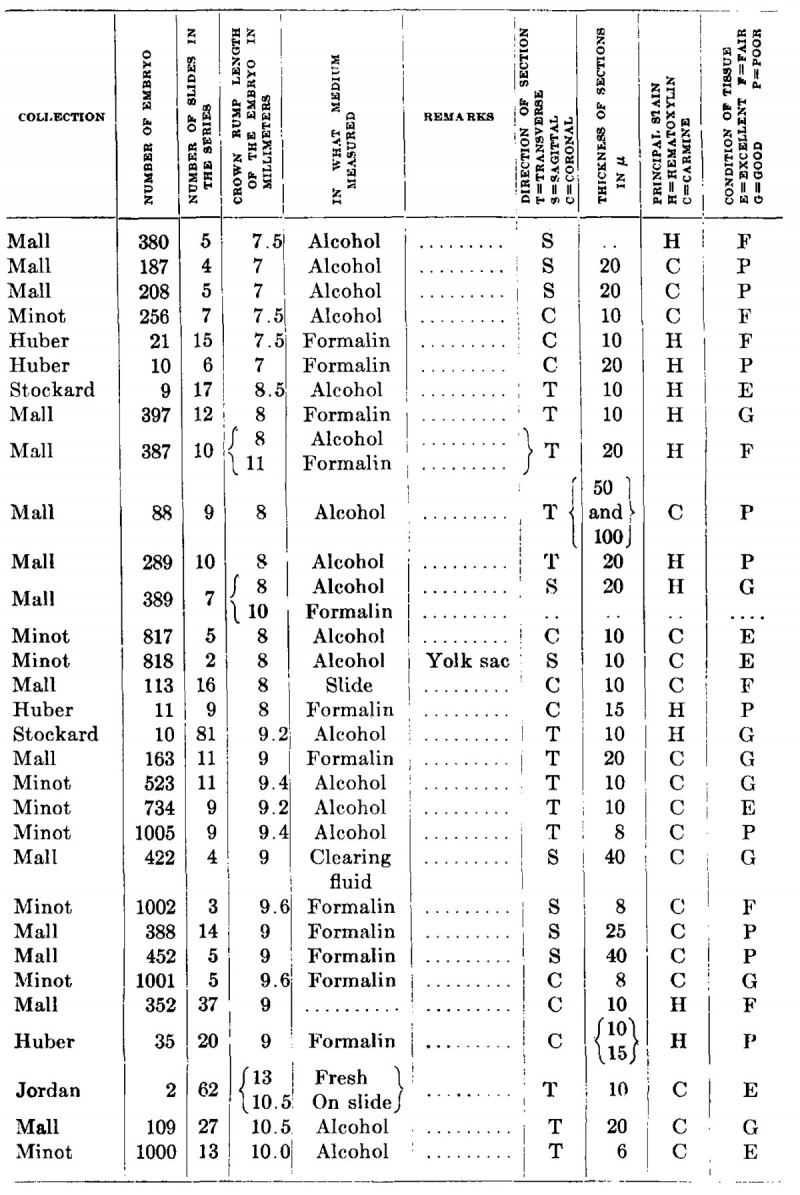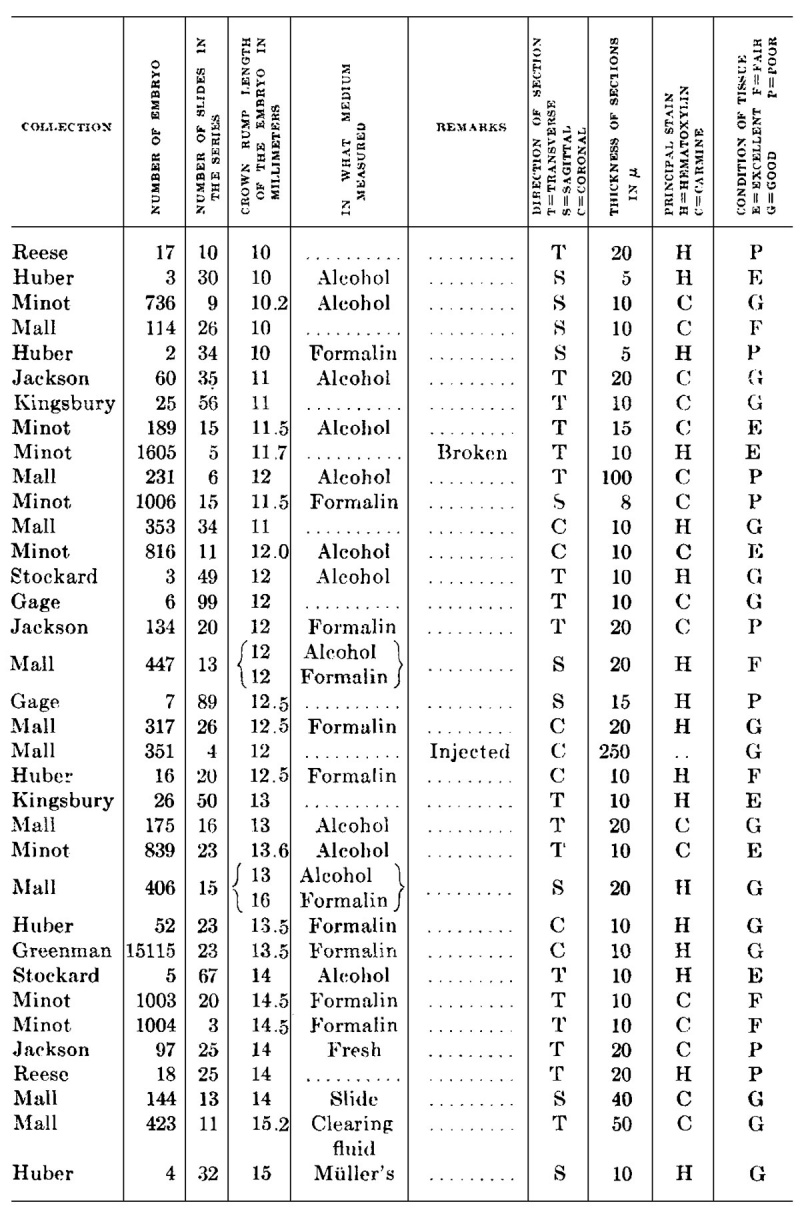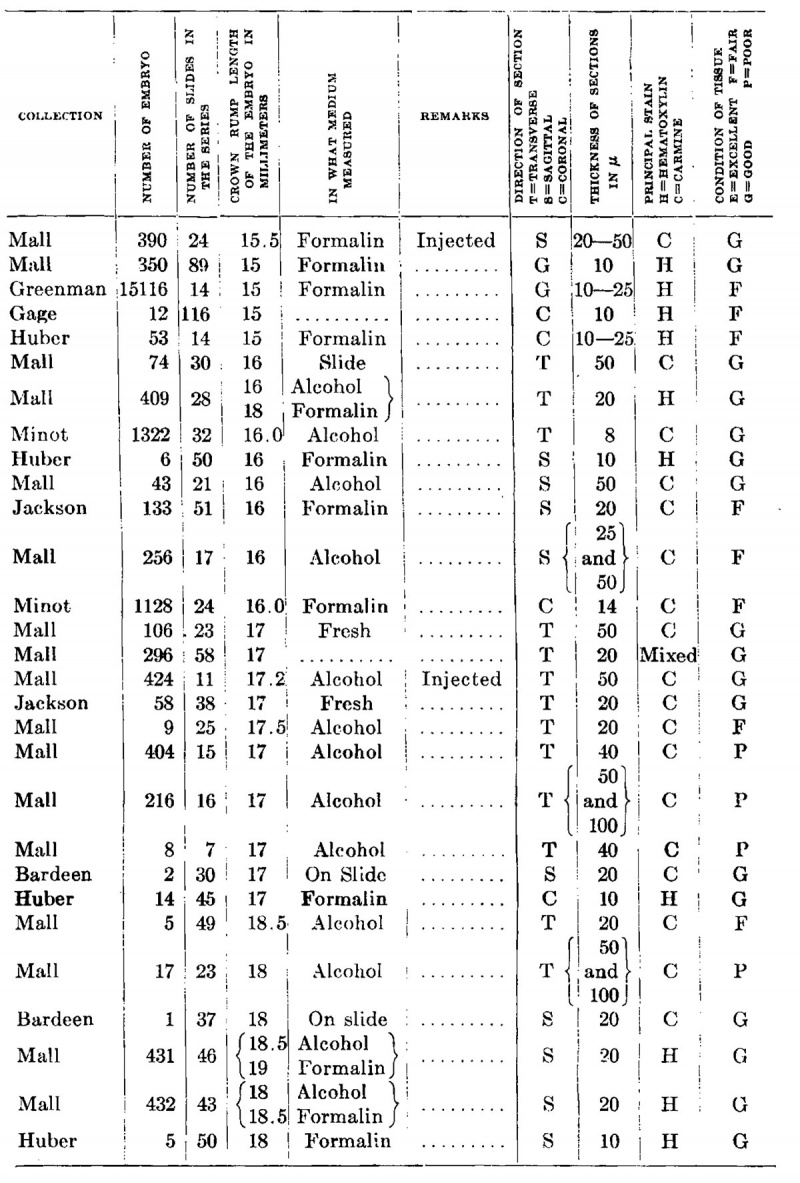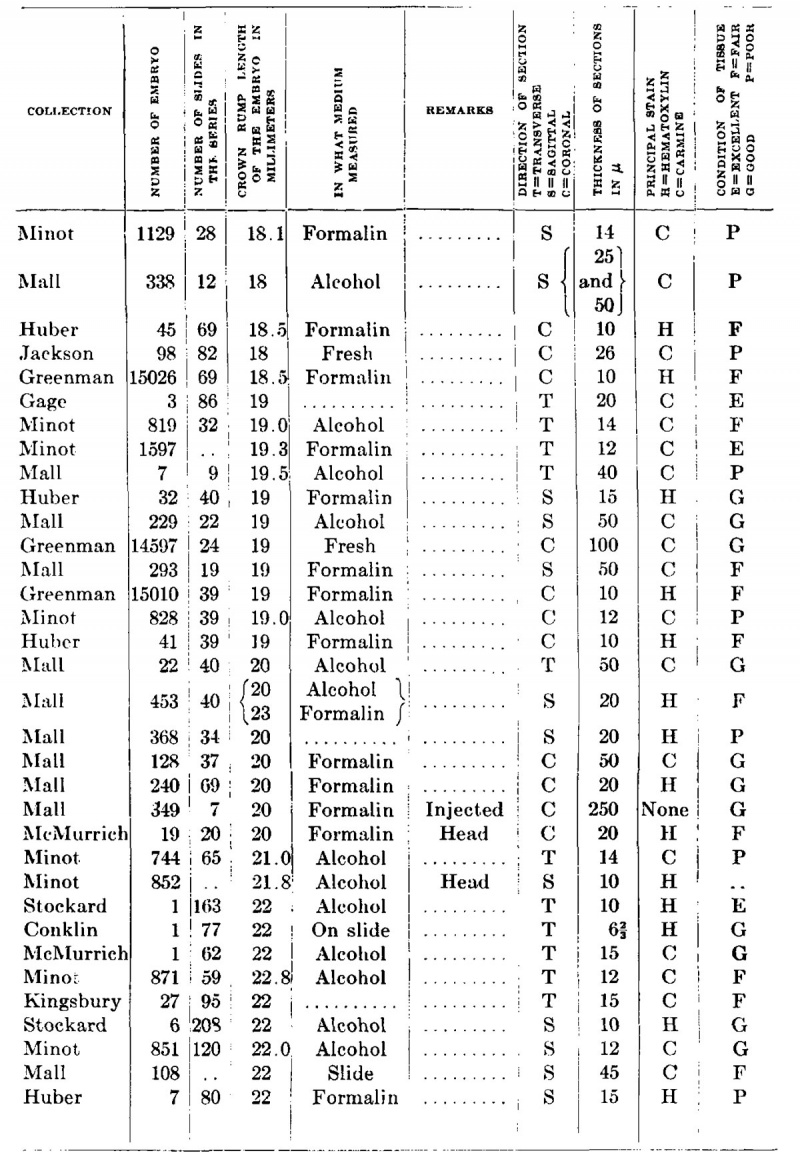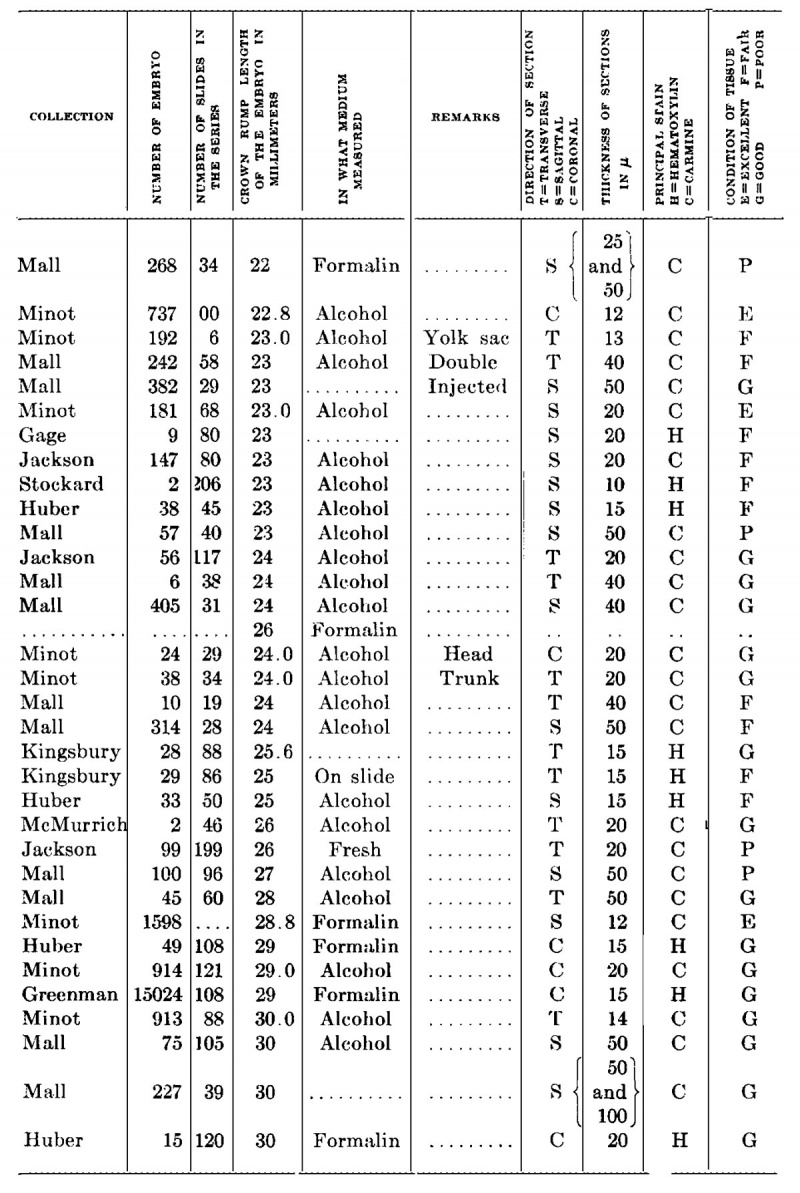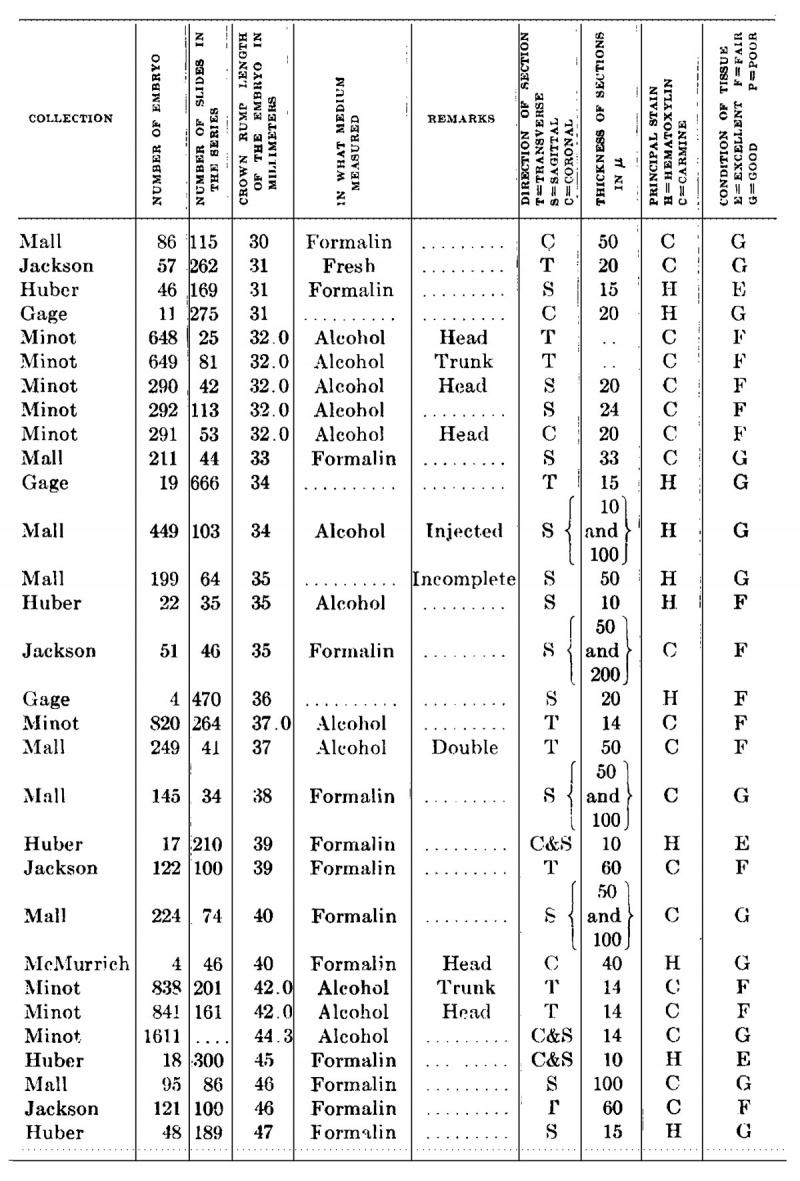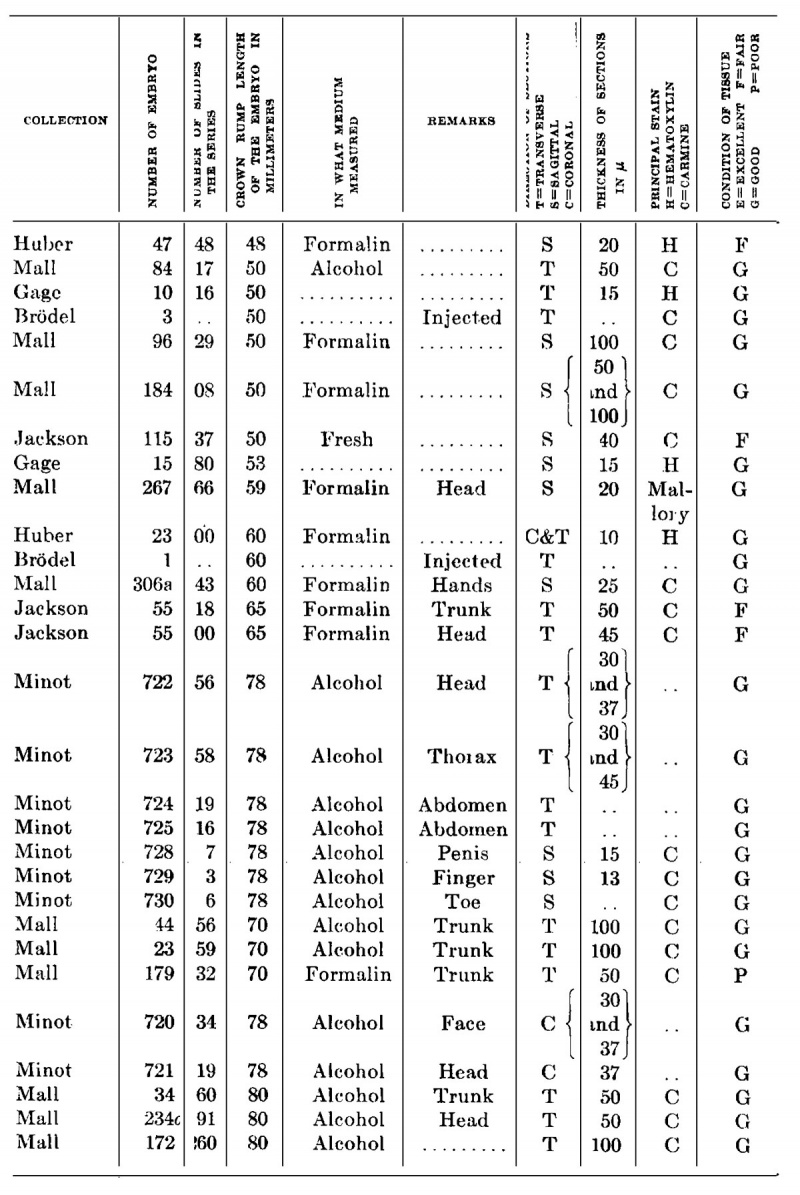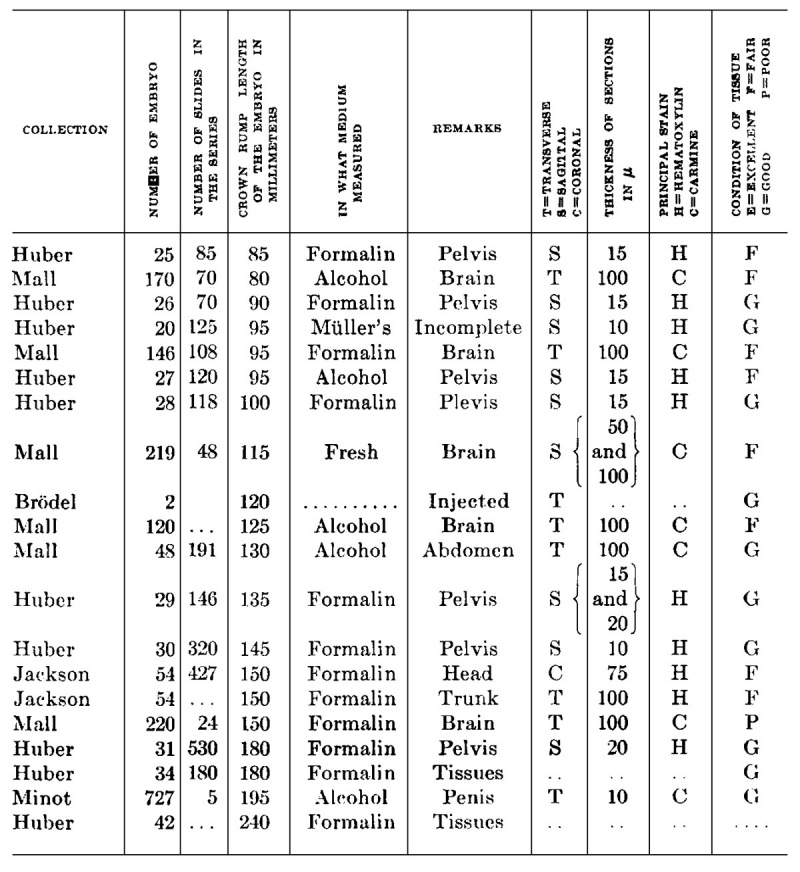Paper - A list of normal human embryos which have been cut into serial sections: Difference between revisions
mNo edit summary |
mNo edit summary |
||
| (5 intermediate revisions by the same user not shown) | |||
| Line 1: | Line 1: | ||
{{Header}} | {{Header}} | ||
{{Ref-Mall1910}} | {{Ref-Mall1910}} | ||
{| class="wikitable mw-collapsible mw-collapsed" | |||
! Online Editor | |||
|- | |||
|[[File:Mark_Hill.jpg|50px|left]] This 1910 historic paper by Mall describes the human embryos sectioned in the [[Carnegie Collection]]. | |||
<br> | |||
See also {{Mall Links}} | |||
<br> | |||
[[Book - Manual of Human Embryology|Manual of Human Embryology]] | |||
<br><br> | |||
Keibel and Elie received grants from the Grand Duchy of Baden and from the Royal Prussian Academy of Sciences. | |||
* The Grand Duchy of Baden was a state in the southwest German Empire on the east bank of the Rhine that existed between 1806 and 1918. | |||
* The Royal Prussian Academy of Sciences (''Königlich-Preußische Akademie der Wissenschaften'') was an academy established in Berlin, Germany on 11 July 1700. | |||
<br><br> | |||
'''Modern Notes:''' [[Embryonic Development]] | [[Carnegie Collection]] | [[Carnegie Embryos]] | |||
|} | |||
{{Historic Disclaimer}} | {{Historic Disclaimer}} | ||
=A List Of Normal Human Embryos Which Have Been Cut Into Serial Sections= | =A List Of Normal Human Embryos Which Have Been Cut Into Serial Sections= | ||
[[File:Franklin Mall 01.jpg|thumb|link=Embryology_History_-_Franklin_Mall|Franklin Mall (1911)]] | |||
[[Embryology_History_-_Franklin_Mall|Franklin P. Mall]] | |||
From the Anatomical Laboratory, Johns Hopkins University | |||
==Introduction== | |||
At the Baltimore meeting of the Anatomists a number of embryologists requested The Wistar Institute to prepare a catalogue of human embryos found in various laboratories, museums and private collections in the United States, which have been sectioned and mounted for study. Accordingly a blank was prepared which was widely distributed, but replies were obtained from only those laboratories which possessed a number of series of sections. These blanks, which were not uniformly filled out, were given to me by Dr. Greenman, with the request that they be blended into a single list for the use of those interested in human embryology. Before publishing it, Dr. Huber kindly inserted a note in asking for further data, especially concerning specimens which had not yet been reported upon. The replies thus received, together with those secured by Dr. Greenman, make this list as complete as we can hope to make it at the present time. | At the Baltimore meeting of the Anatomists a number of embryologists requested The Wistar Institute to prepare a catalogue of human embryos found in various laboratories, museums and private collections in the United States, which have been sectioned and mounted for study. Accordingly a blank was prepared which was widely distributed, but replies were obtained from only those laboratories which possessed a number of series of sections. These blanks, which were not uniformly filled out, were given to me by Dr. Greenman, with the request that they be blended into a single list for the use of those interested in human embryology. Before publishing it, Dr. Huber kindly inserted a note in asking for further data, especially concerning specimens which had not yet been reported upon. The replies thus received, together with those secured by Dr. Greenman, make this list as complete as we can hope to make it at the present time. | ||
| Line 17: | Line 33: | ||
As the embryos in a collection are usually referred to by the name of the collector, this designation has been retained in this list. By consulting therefore the list of the names of anatomists as given in this volume of it will be easy to learn where an embryo of a given length may be found. | As the embryos in a collection are usually referred to by the name of the collector, this designation has been retained in this list. By consulting therefore the list of the names of anatomists as given in this volume of it will be easy to learn where an embryo of a given length may be found. | ||
The specimens are arranged | The specimens are arranged according to their length. The medium in which they were measured is also given. The number of slides in the series is of value when requests for loans are made. The “remarks” are self explanatory. Only the chief stain is given in each case. Most of the embryos are counterstained; in [[Embryology History - Charles Minot|Minot]]’s [[Harvard Collection|collection]] often with Lyons blue, in Jackson’s with congo red, in Gage’s with eosin; and in [[Embryology History - G. Carl Huber|Huber]]’s and mine, some with eosin and some with congo red. | ||
The | The specimens are arranged first, according to their crownrump length, then according to the direction of the sections, and finally according to the quality of the series. Only those marked “excellent” or “good” are of great value for study, but in special cases “fair” and “poor” series no doubt will be of value. | ||
At a future date it may be desirable to rearrange the specimens with profile outlines of each stage, and this would be a great step in advance, for undoubtedly embryos several millimeters apart in this list may be of the same stage of development. Sooner or later we must designate embryos by their stage of development, not by their crown-rump length,—certainly not by their age, which is the Worst method of all and has brought about much confusion in embryology. | |||
The use of a list as here given is amply justified when we consider the nature of the subject before us. Only by cooperation can we hope to advance the science of human embryology, — a subject which is of first importance to anatomists. Witness the Value of cooperation in His’s “''Anatomie menschlisher Embryonen''” and in Keibel and Elze’s “''Normentafel zur Entwicklungsgeschichte des Menschen''”. His secured embryos through the aid of various physicians and scientists, but it took a lifetime for him to make a fairly satisfactory collection of his own, as his various publications will show. [[Embryology History - Franz Keibel|Keibel]] and Elze borrowed embryos from different European collections and thereby were placed at an advantage. These two works are -monumental. | |||
A selected collection of pictures of human embryos which includes several of this list is given in [[Embryology History - Julius Kollmann|Kollmann]]’s “''Handatlas der Entwicklungsgeschichte des Menschen''”. At present there is in preparation a larger work on [[Book - Manual of Human Embryology|Human Embryology]], in two volumes, which will be published shortly both in Leipzig and Philadelphia. About half of this treatise is being prepared by Americans and is based largely upon the collections represented in this list. This cooperative undertaking is not supported by any research grant, but those who have endowed this work with their energies know only too well that their powers would have been greatly augmented had such support been given. It may here be emphasized that efforts to promote the science of human embryology have not received financial support excepting the work of Keibel and Elze, for which they received grants from the Grand Duchy of Baden and from the Royal Prussian Academy of Sciences. | |||
The difficulty of obtaining good material, the care and time consumed in the preparation of good series and in the study of the same (involving often the necessity of making time-consuming reconstructions) makes progress in the study of human embryology very slow. During the past 35 years His repeatedly called attention to the need of financial endowment for, and cooperation in the study of human embryology. At the first meeting of the International Association of Academies, held in Paris in 1901, His proposed that commissions be appointed for the promotion of the study of human embryology and neurology. At that meeting we saw the birth of the Brain Commission, which is working effectively for the study of the brain. A series of Interacadernic Institutes has been established, including our Wistar Institute. At that time the International Association of Academies recommended that the study of human embryology should be supported by various anatomical societies. No steps in this direction were, however, taken by the first International Anatomical Congress, which convened four years later at Geneva. Possibly the Second Congress, which meets this summer in Brussels, may be induced to consider the matter. | |||
These statements indicate that anatomists as individuals are cooperating, but their work will progress slowly unless institutes be established to carry it on with greater vigor. is a clear one. Until the human embryo has been thoroughly investigated human anatomy will not rest upon a sound basis. | |||
==Table - Sectioned Embryos== | |||
[[File:Mall1910 table01.jpg|800px]] | |||
[[File:Mall1910 table02.jpg|800px]] | |||
[[File:Mall1910 table03.jpg|800px]] | |||
[[File:Mall1910 table04.jpg|800px]] | |||
[[File:Mall1910 table05.jpg|800px]] | |||
[[File:Mall1910 table06.jpg|800px]] | |||
[[File:Mall1910 table07.jpg|800px]] | |||
[[File:Mall1910 table08.jpg|800px]] | |||
[[File:Mall1910 table09.jpg|800px]] | |||
[[File:Mall1910 table10.jpg|800px]] | |||
{{Footer}} | {{Footer}} | ||
[[Category:Historic Embryology]] [[Category:Franklin Mall]] | [[Category:Historic Embryology]] [[Category:Franklin Mall]] | ||
[[Category:Draft]] | [[Category:Draft]][[Category:1910's]][[Category:Carnegie Collection]] | ||
Latest revision as of 11:04, 21 February 2020
| Embryology - 19 Apr 2024 |
|---|
| Google Translate - select your language from the list shown below (this will open a new external page) |
|
العربية | català | 中文 | 中國傳統的 | français | Deutsche | עִברִית | हिंदी | bahasa Indonesia | italiano | 日本語 | 한국어 | မြန်မာ | Pilipino | Polskie | português | ਪੰਜਾਬੀ ਦੇ | Română | русский | Español | Swahili | Svensk | ไทย | Türkçe | اردو | ייִדיש | Tiếng Việt These external translations are automated and may not be accurate. (More? About Translations) |
Mall FP. A list of normal human embryos which have been cut into serial sections. (1910) Anat. Rec. 4(10): 355-367.
| Historic Disclaimer - information about historic embryology pages |
|---|
| Pages where the terms "Historic" (textbooks, papers, people, recommendations) appear on this site, and sections within pages where this disclaimer appears, indicate that the content and scientific understanding are specific to the time of publication. This means that while some scientific descriptions are still accurate, the terminology and interpretation of the developmental mechanisms reflect the understanding at the time of original publication and those of the preceding periods, these terms, interpretations and recommendations may not reflect our current scientific understanding. (More? Embryology History | Historic Embryology Papers) |
A List Of Normal Human Embryos Which Have Been Cut Into Serial Sections
From the Anatomical Laboratory, Johns Hopkins University
Introduction
At the Baltimore meeting of the Anatomists a number of embryologists requested The Wistar Institute to prepare a catalogue of human embryos found in various laboratories, museums and private collections in the United States, which have been sectioned and mounted for study. Accordingly a blank was prepared which was widely distributed, but replies were obtained from only those laboratories which possessed a number of series of sections. These blanks, which were not uniformly filled out, were given to me by Dr. Greenman, with the request that they be blended into a single list for the use of those interested in human embryology. Before publishing it, Dr. Huber kindly inserted a note in asking for further data, especially concerning specimens which had not yet been reported upon. The replies thus received, together with those secured by Dr. Greenman, make this list as complete as we can hope to make it at the present time.
There are about 300 specimens listed in this catalogue, and of these about one-half are well preserved. When it is considered that the series of human embryos in the embryological collection of the Anatomical Laboratory of Johns Hopkins University are selected from about 1000 abortions, it may safely be stated that but 5 per cent of them yield good serial sections of normal embryos. This list then is a selected one from about 3000 abortions, ‘ova, embryos and young foetuses.
As the embryos in a collection are usually referred to by the name of the collector, this designation has been retained in this list. By consulting therefore the list of the names of anatomists as given in this volume of it will be easy to learn where an embryo of a given length may be found.
The specimens are arranged according to their length. The medium in which they were measured is also given. The number of slides in the series is of value when requests for loans are made. The “remarks” are self explanatory. Only the chief stain is given in each case. Most of the embryos are counterstained; in Minot’s collection often with Lyons blue, in Jackson’s with congo red, in Gage’s with eosin; and in Huber’s and mine, some with eosin and some with congo red.
The specimens are arranged first, according to their crownrump length, then according to the direction of the sections, and finally according to the quality of the series. Only those marked “excellent” or “good” are of great value for study, but in special cases “fair” and “poor” series no doubt will be of value.
At a future date it may be desirable to rearrange the specimens with profile outlines of each stage, and this would be a great step in advance, for undoubtedly embryos several millimeters apart in this list may be of the same stage of development. Sooner or later we must designate embryos by their stage of development, not by their crown-rump length,—certainly not by their age, which is the Worst method of all and has brought about much confusion in embryology.
The use of a list as here given is amply justified when we consider the nature of the subject before us. Only by cooperation can we hope to advance the science of human embryology, — a subject which is of first importance to anatomists. Witness the Value of cooperation in His’s “Anatomie menschlisher Embryonen” and in Keibel and Elze’s “Normentafel zur Entwicklungsgeschichte des Menschen”. His secured embryos through the aid of various physicians and scientists, but it took a lifetime for him to make a fairly satisfactory collection of his own, as his various publications will show. Keibel and Elze borrowed embryos from different European collections and thereby were placed at an advantage. These two works are -monumental.
A selected collection of pictures of human embryos which includes several of this list is given in Kollmann’s “Handatlas der Entwicklungsgeschichte des Menschen”. At present there is in preparation a larger work on Human Embryology, in two volumes, which will be published shortly both in Leipzig and Philadelphia. About half of this treatise is being prepared by Americans and is based largely upon the collections represented in this list. This cooperative undertaking is not supported by any research grant, but those who have endowed this work with their energies know only too well that their powers would have been greatly augmented had such support been given. It may here be emphasized that efforts to promote the science of human embryology have not received financial support excepting the work of Keibel and Elze, for which they received grants from the Grand Duchy of Baden and from the Royal Prussian Academy of Sciences.
The difficulty of obtaining good material, the care and time consumed in the preparation of good series and in the study of the same (involving often the necessity of making time-consuming reconstructions) makes progress in the study of human embryology very slow. During the past 35 years His repeatedly called attention to the need of financial endowment for, and cooperation in the study of human embryology. At the first meeting of the International Association of Academies, held in Paris in 1901, His proposed that commissions be appointed for the promotion of the study of human embryology and neurology. At that meeting we saw the birth of the Brain Commission, which is working effectively for the study of the brain. A series of Interacadernic Institutes has been established, including our Wistar Institute. At that time the International Association of Academies recommended that the study of human embryology should be supported by various anatomical societies. No steps in this direction were, however, taken by the first International Anatomical Congress, which convened four years later at Geneva. Possibly the Second Congress, which meets this summer in Brussels, may be induced to consider the matter.
These statements indicate that anatomists as individuals are cooperating, but their work will progress slowly unless institutes be established to carry it on with greater vigor. is a clear one. Until the human embryo has been thoroughly investigated human anatomy will not rest upon a sound basis.
Table - Sectioned Embryos
Cite this page: Hill, M.A. (2024, April 19) Embryology Paper - A list of normal human embryos which have been cut into serial sections. Retrieved from https://embryology.med.unsw.edu.au/embryology/index.php/Paper_-_A_list_of_normal_human_embryos_which_have_been_cut_into_serial_sections
- © Dr Mark Hill 2024, UNSW Embryology ISBN: 978 0 7334 2609 4 - UNSW CRICOS Provider Code No. 00098G

